#like all the doctors are some flavor of queer but he’s a lesbian
Text
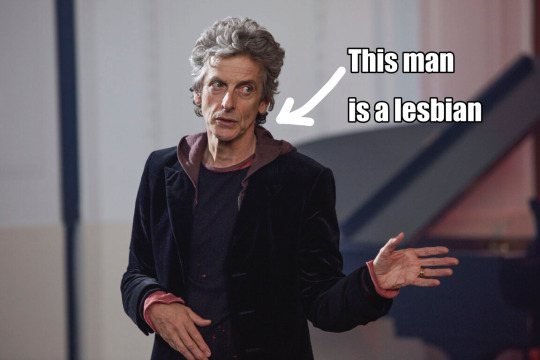
Do you understand what I’m saying
#this is not my best work but it will have to do#doctor who#the doctor#twelfth doctor#like all the doctors are some flavor of queer but he’s a lesbian#I know it because he told me#he him lesbian in love with his wives#(missy and river)#dw#my stuff
1K notes
·
View notes
Text
About
I'm Kaz! I'm a masc nonbinary ace (probably some flavor of aro) lesbian. They/he/she pronouns (in order of preference).
I'm 22. Please only follow if you're 18+. I will block if you are not.
I have comorbid ADHD and autism. I'm not good at conveying/picking up tone, just as a heads up. I can come across as overly aggressive sometimes because of it. Sorry in advance
Follows/replies from @yuribalisms
Mutuals can ask for my discord!
Primarily a fic writer, but meta and analysis is also common.
This is primarily an anime/manga blog, but other media may crop up from time to time
Primary fandoms: Kimetsu no Yaiba, Jujutsu Kaisen, Chainsaw Man, Bleach
Secondary fandoms: Puella Magi Madoka Magica, Dungeon Meshi, Trigun, Fullmetal Alchemist, One Piece, Mob Psycho 100, Doctor Who
I do not consider myself pro-ship or anti-ship. I think it's a reductive way of interacting with fiction and I will not engage with either side of that particular discourse.
Navigation
All original posts are tagged with #kaz rambles
All my fics are tagged with #my fics
All wlw art is tagged with #sapphic <3
Favorite art of attractive women is tagged with #not to be a lesbian but oh my fucking—
I tag all posts related to a fandom with that fandom. If it is something I blog about even semi-frequently, I also tag all characters and ships featured.
NOT SPOILER FREE! And I do not tag for spoilers
I do not have any triggers tagged. You can ask to have something tagged, but I cannot guarantee I will remember. However, I will not tag with blood or violence warnings, as these are things I post/reblog very frequently.
I don't reblog nsfw images often, but if I do, I try to remember to tag them as #nsft. Nsfw text is not tagged.
I am most definitely into blood/gore/cannibalism kink/fetish stuff. It crops up often here. Do with that info what you will.
Other
No DNI as I think they are functionally useless, but if you irritate me, or are a dick, I will block.
I block very liberally, so if you are/get blocked as a random fandom blog, sorry! It probably wasn't for anything that is a big deal. Especially if you frequently post in tags. I tend to block all x-reader blogs on sight
This blog is mostly anime/manga centric, but I also post/reblog a lot of feminism topics/discussions, as well as discussions of misogyny, transmisogyny, and lesbophobia. I’m esp tired of these issues getting ignored and perpetuated within queer spaces so a lot of discussions from that specific angle.
Most likely, I won't follow back. I almost exclusively follow sapphics and/or ppl who almost exclusively post about the same fandoms as me, and that is unlikely to change.
Ty for reading! Enjoy your scrolling!
13 notes
·
View notes
Text
Discover the Best Espresso Machine for Your Home: A 2024 Buyer’s Guide

This ultimate guide helps coffee lovers find the best espresso machines for their homes. It covers top picks, including the Breville Bambino Plus, De’Longhi La Specialista, SPINN Coffee Maker, and Cuisinart DGB-550BKP1 Grind & Brew. Each caters to different needs, whether for quality, convenience, technology, or budget-friendliness. The guide emphasizes the importance of matching personal preferences with machine features.
1 note
·
View note
Note
now allow me to fill you in on our cast of characters, all with a healthy dose of found family. (note that if i say a sexuality or anything of that sort its likely a headcanon, this show was made in like the 80s or 90s)
Captain Benjamin Sisko: human. he's like. the only one on this show who isn't some flavor of queer. he's the supportive ally and also very dadcoded (but also has like. an actual son. his name is jake and someone compared me to him once). sisko is in charge of the station! he calls all the shots and is also apparently part bajoran god? he also really likes baseball! one time (in the middle of space war) he taught all his senior officers how to play baseball so he could be petty and win against some dude he didnt like.
Colonel Kira Nerys: bajoran! she's definitely lesbian. she also used to be a terrorist, but now she's second in command! shes got a very queer relationship with the science officer, jadzia dax. her character is really fun. she's technically not a part of starfleet, since she still works for bajor, and that means she gets to bend the rules a little bit. she's stubborn, and her temper can run a bit high, which provides for a contrast with sisko. canonically, shes with odo, and their relationship is the most boring EVER except for when they got together that was so fucking funny
Doctor Julian Bashir: MY SKRUNKLY!!!! he's just a human guy but he's genetically modified because his parents are ableist! he's definitely autistic, transgender, AND bisexual. and when he was a kid, he was special needs, and learned very slowly, and his parents HATED that so they illegally turned him into a super human intelligence wise (and BECAUSE it's illegal, he hides this for most of the series). he aslo CANNOT stop committing medical malpractice and flirting with his patients its awful. hes got a Very Very Homoeroitc relationship with one Elim Garak, who refers to him consistently as "my dear doctor" (they're clearly fucking).
Chief Miles O'Brien: human, literally just some guy, goes through The Horrors regularly. i wish i could remember some of the shit the writers put him through because they do him SO dirty every time there is an episode centered around him. he's the maintenance guy and he technically isnt even an official officer. he was also on a previous show, star trek: the next generation. he's got a wife and kids and a Weird relationship with bashir. theyve at least explored each others bodies.
Jadzia Dax: i forgot her rank. actually. but she;s trill! the trill are weird because there are the PEOPLE and then there are the worms (symbiotes or however its spelled) and you can choose to get joined with a worm or not. jadzia is joined so shes got a shit ton of memories of like 7 other people (kinda systemcore /projecting) and she's best friends with sisko. she's the science officer and canonically gets with worf. they get married, their relationship is... interesting? she's very fun tho, shes got tons of skills from her worms knowledge and she regularly wins at gambling.
(THERE ARE MORE IM SENDING ANOTHER ASK AND PRAYING THIS ONE DOESNT GET EATEN)
I love the comments on how some of these guys have explored each other's bodies. Also we love queer coded guys and system coded guys. Obsessed with their names they're like so normal but to the left
1 note
·
View note
Note
hi. on your post where you may or may not have ended on 'moffat is either your angel or your devil' did you have maybe an elaboration on that somewhere that i could possibly hear about. i'm very much a capaldi era stan and i've never tried to defend the matt smith era even though it had delightful moments sometimes so i wonder where that puts me. i'd love to hear your perspective on moffat as a person with your political perspective. -nicole
hi ok sorry i took so long to respond to this but i dont think you know how LOADED this question is for me but i am so happy to elaborate on that for you. first a few grains of salt to flavor your understanding of the whole situation: a. im unfairly biased against moffat bc im a davies stan and a tennant stan; b. i still very much enjoy and appreciate moffat era who for many reasons; and c. i hate moffat on a personal level far more than i could ever hate his work.
the thing is that its all always gonna be a bit mixed up bc i have to say a bunch of seemingly contradictory things in a row. for instance, a few moffat episodes are some of my absolute favorites of the rtd era, AND the show went way downhill when moffat took over, AND the really good episodes he wrote during the rtd era contained the seeds of his destruction.
like i made that post about the empty child/the doctor dances and it holds true for blink and thats about it bc the girl in the fireplace and silence in the library/forest of the dead are good but not nearly on the same level, and despite the fact that i like them at least nominally, they are also great examples of everything i hate about moffat and how he approached dw as a whole.
basically. doctor who is about people. there are many things about moffats tenure as showrunner that i think are a step up from rtd era who! actual gay people, for one! but i think that can likely be attributed mostly to an evolving Society as opposed to something inherent to him and his work, seeing as rtd is literally gay, and the existence of queer characters in moffats work doesnt mean the existence of good queer characters (ill give him bill but thats it!)
i have a few Primary Grievances with moffat and how he ran dw. all of them are things that got better with capaldi, but didnt go away. they are as follows:
moffat projects his own god complex onto the doctor
rtd era who had a doctor with a god complex. you cant ever be the doctor and not have a god complex. the problem with moffats era specifically is that the god complex was constant and unrepentant and was seen as a fundamental personality trait of the doctor rather than a demon he has to fight. he has the Momence where you feel bad for him, the Momence where he shows his humility or whatever and youre reminded that he doesnt want to be the lonely god, but those are just. moments. in a story where the doctor thinks hes the main character. rtd era doctor was aware that he wasnt the main character. he had to be an authority sometimes and he had to be the loner and he had to be sad about it, but he ultimately understood that he was expendable in a narrative sense.
this is how you get lines like “were the thin fat gay married anglican marines, why would we need names as well?” from the same show that gave you the gut punch moment at the end of midnight when they realize that nobody asked the hostess for her name. and on the one hand, thats a small sticking point, but on the other hand, its just one small example of the simple disregard that moffat has for humanity.
incidentally, this is a huge part of why sherlock sucked so bad: moffats main characters are special bc theyre so much bigger and better than all the normal people, and thats his downfall as a showrunner. he thinks that his audience wants fucking sheldon cooper when what they want is people.
like, ok. think of how many fantastic rtd era eps are based in the scenario “what if the doctor wasnt there? what if he was just out of commission for a bit?” and how those eps are the heart of the show!! bc theyre about people being people!! the thing is that all of the rtd era companions would have died for the doctor but he understood and the story understood that it wasnt about him.
this is like. nine sending rose home to save her life and sacrifice his own vs clara literally metaphysically entwining her existence w the doctor. ten also sending rose with her family to save her life vs river being raised from infancy to be obsessed w the doctor and then falling in love w him. martha leaving bc she values herself enough to make that decision vs amy being treated like a piece of meat.
and this is simultaneously a great callback to when i said that moffats episodes during the rtd era sometimes had the same problems as his show running (bc girl in the fireplace reeks of this), and a great segue into the next grievance.
moffat hates women
he hates women so fucking much. g-d, does steven moffat ever hate women. holy shit, he hates women. especially normal human women who prioritize their normal human lives on an equal or higher level than the doctor. moffat hated rose bc she wasnt special by his standards. the empty child/the doctor dances is the nicest he ever treated her, and she really didnt do much in those eps beyond a fuck ton of flirting.
girl in the fireplace is another shining example of this. youve got rose (who once again has another man to keep her busy, bc moffat doesnt think shes good enough for the doctor) sidelined for no reason only to be saved by the doctor at the last second or whatever. and then youve got reinette, who is pretty and powerful and special!
its just. moffat thinks that the doctor is as shallow and selfish as he is. thats why he thinks the doctor would stay in one place with reinette and not with rose. bc moffat is shallow and sees himself in the doctor and doesnt think he should have to settle for someone boring and normal.
not to mention rose met the doctor as an adult and chose to stay with him whereas reinette is. hm. introduced to the doctor as a child and grows up obsessed with him.
does that sound familiar? it should! bc it is also true of amy and river. and all of them are treated as viable romantic pairings. bc the only women who deserve the doctor are the ones whose entire existence revolves around him. which includes clara as well.
genuinely i think that at least on some level, not even necessarily consciously, that bill was a lesbian in part bc capaldi was too old to appeal to mainstream shippers. like twelve/clara is still a thing but not as universally appealing as eleven/clara but i am just spitballing. but i think they weighed the pros and cons of appealing to the woke crowd over the het shippers and found that gay companion was more profitable. anyway the point is to segue into the next point, which is that moffat hates permanent consequences.
moffat hates permanent consequences
steven moffat does not know how to kill a character. honestly it feels like hes doing it on purpose after a certain point, like he knows he has this habit and hes trying to riff on it to meme his own shit, but it doesnt work. it isnt funny and it isnt harmless, its bad writing.
the end of the doctor dances is so poignant and so meaningful and so fucking good bc its just this once! everybody lives, just this once! and then he does p much the same thing in forest of the dead - this one i could forgive, bc i do think that preserving those peoples consciousnesses did something for the doctor as a character, it wasnt completely meaningless. but everything after that kinda was.
rory died so many times its like. get a hobby lol. amy died at least once iirc but it was all a dream or something. clara died and was erased from the doctors memory. river was in prison and also died. bill? died. all of them sugarcoated or undone or ignored by the narrative to the point of having effectively no impact on the story. the point of a major character death is that its supposed to have a point. and you could argue that a piece of art could be making a point with a pointless death, ie. to put perspective on it and remind you that bad shit just happens, but with moffat the underlying message is always “i can do whatever i want, nothing is permanent or has lasting impact ever.”
basically, with moffat, tragedy exists to be undone. and this was a really brilliant, really wonderful thing in the doctor dances specifically bc it was the doctor clearly having seen his fair share of tragedy that couldnt be helped, now looking on his One Win with pride and delight bc he doesnt get wins like this! and then moffat proceeded to give him the same win over and over and over and over. nobody is ever dead. nobody is ever unable to be saved. and if they are, really truly dead and/or gone, then thats okay bc moffat has decided that [insert mitigating factor here]*
*the mitigating factor is usually some sort of computerized database of souls.
i can hear the moffat stans falling over themselves to remind me that amy and rory definitely died, and they did - after a long and happy life together, they died of old age. i dont consider that a character death any more than any other character choosing to permanently leave the tardis.
and its not just character deaths either, its like, everything. the destruction of gallifrey? never mind lol! character development? scrapped! the same episode four times? lets give it a fifth try and hope nobody notices. bc he doesnt know how to not make the doctor either an omnipotent savior or a self-pitying failure.
it is in nature of doctor who, i believe, for the doctor to win most of the time. like, it wouldnt be a very good show if he didnt win most of the time. but it also wouldnt be a very good show if he won all of the time. my point is that moffats doctor wins too often, and when he doesnt win, it feels empty and hollow rather than genuinely humbling, and you know hes not gonna grow from it pretty much at all.
so like. again, i like all of doctor who i enjoy all of it very much. i just think that steven moffat is a bad show runner and a decent writer at times. and it is frustrating. and im not here to convince or convert anyone im just living my truth. thank you for listening.
#sorry if this is repetitive or makes no sense or if i got some details of the show wrong#i simply couldnt be bothered to put too much effort into this post#lest it become a research paper and take me several weeks to answer#anyway thats all my opinions#dw#ok to rb
210 notes
·
View notes
Text
Adventures in Aphobia #1
So I was scrolling through Tumblr the other day (a regrettable mistake as always), and I had the great pleasure of seeing this joyous post.
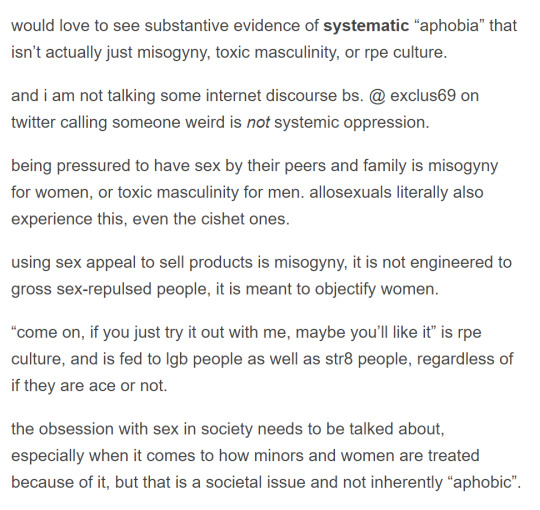
*deep breath*
Not gonna lie, posts like this make me real pissed. Pissed because the person who posted this exists in a space where they feel comfortable enough to post this online. Pissed because these posts are so common and often face little backlash. And pissed because there’s nothing better than allosexuals condescendingly explaining to asexual people why they’re dirty attention whores who invent their own oppression. Ace people deserve to be defended against this horseshit. Young people see these posts, and it’s extremely damaging to have your identity be nothing more than fuel for people in discourse to mock you and demand you bled in order for them to notice your pain.
Anger aside, many people do not see why this post is wrong, so why is it? Let’s unpack this clusterfuck of bigotry:
“would love to see substantive evidence of systematic “aphobia” that isn’t actually just misogyny, toxic masculinity, or rpe culture.”
God damn, we are not mincing our words here XD. A few things: systematic in bold, which tells you if you do not make a blood sacrifice on the altar of queer pain you will not be taken seriously. Potential nitpick, but systemic and systematic are not the same thing. I believe systemic is the word they’re looking for. Systematic implies a lot more intentionality that can be hard to prove. Systemic merely means that systems, in their current state, do aphobic things, which they absolutely do.
“Aphobia” in quotes is absolutely rich. Not only will this person refuse to acknowledge systemic aphobia, which is only one type, but this poster casts clear doubt upon the mere concept of aphobia in and of itself. We love to see it.
There’s a lot to unpack here. The statement, as clearly condescending as intended, is sort of correct, though it doesn’t mean a whole lot. Systemic oppression is about the systems in a society (government, healthcare, etc) discriminating against people. Systemic oppression is not bigotry faced on a person-to-person level. In short, systematic oppression is something a person experiences in their overall life, while personal discrimination is experienced on a personal level by people who are not singularly in control of the systems. This post boils down the negative comments ace people face into being called “weird”, which is an understatement for sure, but calling a gay person weird isn’t systemic oppression either.
It’s still bad and discriminatory.
This is such a snotty way to dismiss aphobia as some mere, insignificant comment with no meaning as if it doesn’t reinforce society’s painful aphobic views in the same way casual homophobic comments reinforce heteronormativity and society’s hostility toward gay people.
Ace people face discrimination in healthcare, most notably, which is systemic discrimination, but the systemic discrimination of asexuals really ought to be its own post if I’m to nosedive into it. Even if ace people faced no systemic discrimination, it wouldn’t make this point anymore correct. Discrimination is a perfectly valid reason to feel disregarded by society, and often only ace people are denied the right to feel this way and are instead gaslit into admitting what they face is no big deal and they’re just making it up for attention.
The experience of being pressured to have sex when you’re allo vs ace is very different. The vast majority of allo people do not plan to be celibate their whole lives. Many ace people do not want to have sex, ever. “Waiting for sex” in much of western society and in Christianity is seen as pure and honorable. Yet being asexual and never wanting sex is seen as a deviant disorder and people are accused of robbing their partner of sex forever.
There’s really a specific flavor of sexual pressure that is unique to ace people. Sex being to “fix” someone or because they “just need to try it”.
In this respect, aphobic sexual pressure is better compared to that faced by gay people and lesbians. Lesbians especially often can face this same struggle, men pressuring them to have sex because they think lesbians just need to “try it” or to “fix them”. I can imagine this poster would have no issue acknowledging lesbophobia being the root of lesbians coerced into sex with men, yet she does not give ace people the same.
Imagine if someone said (and knowing our fucked world, someone probably has): “Lesbophobia doesn’t exist. It’s just misogyny. Straight women are coerced into sex too!”
It’d be pathetic bullshit. Toxic masculinity, misogyny and many other issues can all tangle into combined messes with other forms of bigotry. Lesbophobia is an experience that deserves to be recognized apart from misogyny, even if the two are linked. Please stop erasing ace people’s experiences with this when it’s not the same thing.
Honestly, though, this post, as trashy as it is, if anything, is perhaps, really asking: Is there any type of aphobic experience that’s inherently exclusive to ace people?
I still wager to go say, yes, yes there is, but I must make an important point first:
Most experiences of queer discrimination are not limited to queer people.
Homophobia and transphobia are both experienced by cishets in certain instances. Feminine straight men can be victims of homophobic harassment. This does not disprove the fact that it’s homophobia just because a straight man is the victim of it. A tall cis woman with broad shoulders and a lower voice may be the victim of transphobic remarks or comments. The basis of these comments is rooted in transphobia, however, so the fact that the victim is cis does not erase the transphobia.
People who argue that experiences ace people complain about can be experienced by allosexuals are not poking a legitimate hole in doing this. Certain experiences related to aphobia can and are experienced by allosexuals. If you do not acknowledge this, then homophobia and transphobia aren’t real because cishet people have sometimes experienced them.
Despite cishets sometimes experiencing queerphobia, most of us acknowledge that their experience of that bigotry, however unfortunate, is not the same as that experienced by actual queer people. It’d be quite homophobic for a feminine straight man to claim he knew just as much about the gay experience as an actual gay man. Similarly, when allosexual people relate experiences that were rooted in aphobia, it’s overstepping a line when they claim asexual discrimination isn’t real because they experienced elements of it too.
Cishet (cishet including allosexuals) people do not experience their doctors telling them their sexuality might be a disorder or caused by trauma. Allo queer people can experience this with their sexualities too.
“using sex appeal to sell products is misogyny, it is not engineered to gross sex-repulsed people, it is meant to objectify women.”
This is a strawman thinner than my last nerve. Uh, what? What ace people are you seeing that literally think sex appeal was engineered to gross-out sex-repulsed people?? I don’t think this is a core argument??
Yes, sex-repulsed ace people sometimes complain about sex appeal in media being uncomfortable. But that’s it. Every time an ace person shares a discomfort of theirs doesn’t mean it’s the entire basis of their oppression. For the love of God, let ace people discuss their experiences without being blow-torched over not being oppressed enough with an individual discomfort.
BONUS ROUND
(This was in the tags)
“Completely vilifies celibate individuals”
...no…? What…? Huh…?
The most charitable interpretation of this vague accusation is that the poster means celibate people face aphobia as well, due to not wanting to have sex. I have no idea how this “vilifies” anyone, but that aside, as said before: people who are not queer can face aphobia. Also worth noting that society treats celibate people way better than ace people, which is really another example of aphobia. Celibate people can be told they’re missing out (which could be at very least related to aphobic ideals), but they’re rarely called broken. Celibacy is seen more as a respected, controlled ideal in allo people, but when ace people want to do it, they’re just mentally ill.
Anyway, the post was aphobic trash, and it needs to be debunked more often. Mocking ace people online is not a good look anymore, guys. Don't be ugly.
#discourse#queer discourse#LGBT discourse#Adventures in Aphobia#ace discourse#asexual discourse#aphobia#ace discrimination#asexual#asexuality#LGBT#queer#ace#rant#aphobes have no shame but they should#imagine having a brain smoother than a banana peel
94 notes
·
View notes
Note
Genuine question I would be interested to get a debate going about with different perspectives: do you think the shower scene promoted unsafe sex?
This is long....disclaimer!
I think the question you really should be asking is does the Skamverse promote safe queer sex?...... no it does not. Once again folks this is fiction and for storytelling purposes SKAM bypasses a lot of the logistics of queer sex. Like sorry to break it to the youngins but if you are queer and are having penetrative sex for the first time its probably gonna involve a lot of prep more for those who will be having anal sex. Less for those having vaginal sex but first time will always be painful, uncomfortable and sensory building. Like its science folks....ya know (and yes am sure you have that one friend that it didn’t hurt but for the most part it hurts or its uncomfortable and a sensation you need to get use too). So let’s talk about what Skam has covered so far..... Hans teaches us about lubricant (big up to our German guru making sure all the gays know water base lube is the best.....I mean FACTS!!Don’t use flavored lube its a novelty for a reason fam). Flippo has showed us about the real scares in the queer community concerning HIV prevention. Also you know Flippo went on a little sex store shopping spree with Marti and told him everything he needed to have in his sex drawer to be a happy sexually active gay(man I miss Flippo).
Milan shows us that hook up culture runs rampant in the queer community but that it doesn't go hand and hand with emotional intimacy to be careful to not confuse the two (as Milan is always going on about wanting something like what sobbe have). Milan also tells us something very important which is if you don’t feel comfortable with something then say it out loud and create a boundary. If that person doesn’t like it then that's not your person. Something that does bother me about SKAM and queer sex is they never discuss or show condom use and its like all the Isak's have never had sexual intercourse before with the same sex and all the Even’s have had sex b4(not David but like also your teens use protection) so like can we have them please use some form of protection like a simple mention of “should I get a condom”. Also the girls..... I know its different based on location but in NYC the queers are abundant in any gender pronoun. It bothers me deeply that we never discuss health and safety regarding queer girls. Ladies/NB folks please be careful, yes certain infection rates are lower but don’t think you can’t catch something from having sex because trust me you 100% can. In cities like NYC there is no shortage of girls/nb to sleep with or have a one night thing with so if you are having a string of short lived hook ups most likely so are they. I wish an overview of options and materials concerning protection would be discussed concerning oral vaginal sex. Lastly for those who have sex with multiple genders. Speaking from experience I tend to also date and or sleep with other people who look at gender with a similar outlook so between me and my partner our sexual partners circle covers a lot of different types of people from strait people to gay/lesbian to bi and everything on the chessboard. So saying that I think having a discussion with your doctor about whether you may need to be on PREP is pretty important. PREP is for HIV prevention. Heavily used amongst gay males (literally everyone I know is on it) but its also used for those who actively have sex with multiple genders at once. I have discussed PREP with the EU fam and tho its available it seems like its frowned upon or people are shy about admitting they are taking it. Its not like that in NYC its similar to discussing being on birth control. It’s not a big deal and its entirely free. Queer kids should not be ashamed to discuss sexual prevention tools because strait kids aren't embarrassed so neither should queer kids be. I wish a SKAM would say the word PREP on camera concerning queer sex its sooo important kids know early to consult a doctor concerning HIV prevention. Also fun fact on the shower scene, paint scene, and crisana laying in bed after the 1st time scene are all inspired by queer cinema in which those scenes are more graphic but Skam is aimed at teens but the shower scene is inspired by Brian & Justin in Queer as folk (and they do use protection in that scene because the series is aimed at adults in the queer community). Thanks for coming to my ted talk!
10 notes
·
View notes
Text
youtube
Watch the 2024 American Climate Leadership Awards for High School Students now: https://youtu.be/5C-bb9PoRLc
The recording is now available on ecoAmerica's YouTube channel for viewers to be inspired by student climate leaders! Join Aishah-Nyeta Brown & Jerome Foster II and be inspired by student climate leaders as we recognize the High School Student finalists. Watch now to find out which student received the $25,000 grand prize and top recognition!
#ACLA24#ACLA24HighSchoolStudents#youtube#youtube video#climate leaders#climate solutions#climate action#climate and environment#climate#climate change#climate and health#climate blog#climate justice#climate news#weather and climate#environmental news#environment#environmental awareness#environment and health#environmental#environmental issues#environmental education#environmental justice#environmental protection#environmental health#high school students#high school#youth#youth of america#school
17K notes
·
View notes
Text
HOW EMILIE AUTUMN’S ASYLUM FOR WAYWARD VICTORIAN GIRLS HELPS EX GAY THERAPY SURVIVORS
DISCAIMER: If you are actively considering harming yourself it might be wise to postpone this journey into my own little corner of the Asylum for Wayward Victorian Persons. Instead, reach out to a mental health professional or call your country’s crisis hotline. Best wishes for your recovery.
As a conversion therapy survivor I tend to look at the world through different lenses than a lot of folks. And that includes how I consume books and music. Recently it struck me that Emilie Autumn’s book The Asylum for Wayward Victorian Girls and it’s corresponding songs are practically tailor made to be relatable for CT survivors such as myself.
The plot revolves around Emilie Autumn in a modern day psych ward, and her Victorian era counter part Emily with a Y, who’s letters she finds in her note book. Accounts of the psych ward and Asylum letters are interspersed, and similarities between modern and old time psychiatric “care” are frankly discussed.
Besides the other girls that are falsely considered mad, for reasons elaborated on in the song Girls! Girls! Girls!, which I will get to shortly, a number of the girls are lesbians and what is being done to them certainly fits the definition of conversion therapy in some of its most pernicious forms. The main character Emily seems to be falling for her fellow inmate Veronica before Veronica’s death at the hands of Doctor Stockill.
Autumn herself is bisexual, and outspoken about her love of the ladies, particularly during her shows. I even got to interact with her on Instagram when I made a post about being an inmate by virtue of my conversion therapy experience. She commented saying,
“I am so proud of you, and honored to march by your side, my fellow inmate.” Now that I’ve set the stage let me move on to the music, and the songs I think most apply to the queer experience.
PRIVATE PRACTICE: This song takes place in the modern mental hospital, and is a conversation between Emilie and Dr. Sharpe. In the song the doctor tries to gaslight her into thinking her usual psychiatrist isn’t any good and she has more wrong with her than just Biplolar Disorder.
“let me help you Emilie, let me fix you Emilie!” Sound familiar? The song even contains religious imagery when Emilie Autumn sings,
“I know this illness is my curse to wear, my cross to bear.” Of course he has ulterior motives, which she figures out by the end of the duet.
SPIDER’S FACE: This one is a metaphor for organized religion. Doctor Stockill brags that he’s going to infect the world with the plague and then bask in their money and adoration when he gives them the remedy. They’ll never ask where it came from. Sort of like how religion creates so much shame around sexuality and then promises to cure what it created with various ineffective and sometimes harmful means.
GIRLS! GIRLS! GIRLS! : Beside admitting straight out that some of the girls are there because they are lesbians, the whole flavor of the song reminds of the dark underbelly that often accompanies ex gay therapy: child exploitation.
GASLIGHT: The title is both literal in the sense that the Asylum is lit by gas but anyone who has looked into narcistic abuse knows the other meaning of this word, which is essentially to try to make someone feel like they are crazy when they are telling the truth. The stark reality of a queer person trapped in a conversion camp really comes through in the lines,
“I hold tight to any hands I see, but nothing is alright, their always watching me. And no one’s coming to take me home.” The imminent possibility of death and the frustrating ignorance of people when it comes to the cruelties taking place under their very noses are also discussed.
I DON’T UNDERSTAND: This is a duet between Emily and Thomson, a man hired to photograph the girls at the asylum. It’s musically beautiful, and reminds me of the way the LGBT community expressed concern and pity upon seeing me broken. It’s a reminder that there’s always humanity even in a broken world
FROM THE GUTTER TO THE STARS: Another duet, this one between Emily and Veronica. It expresses the strength of will queer people express in order to survive and make beauty in the worst of times. Also worthy of note the line,
“Yes I know they could separate us. They don’t even hate us, it’s just what they do.” How many times have we all heard lines like “Hate the sin, love the sinner” and “This is for your own good” coming from people who are hurting us horribly.
TIME FOR TEA: I included this one not for its profundity but for it’s sheer satisfying factor. Finally some justice is befalling the tormentors of the inmates. Many of the implements mentioned as the inmates arm themselves are things that are used in aversion therapy; now they are turned upon the abusers.
START ANOTHER STORY: A softer song about trusting your truth and leaving the past behind as you recover.
ONE FOOT IN FRONT OF THE OTHER: Where to even start with this one. So inspirational, I’m tempted to write all the lyrics out right here, but I’ll just say that it perfectly encapsulates the process of recovering from trauma. Learning to live without an enemy to fight, committing to your own values, and building something beautiful out of the wreckage are central themes.
“How do we change the world to what we want it to be? How do we move beyond all of this misery? One foot in front of the other foot…”
INSPIRATIONAL SONGS FOR CT SURVIVORS FROM FIGHT LIKE A GIRL AND OPHALIAC
FIGHT LIKE A GIRL:
1. The title track, Fight Like a Girl, is a girl power anthem for the ages, but still includes boys who have been through suffering
2. If I Burn is a revenge promise for those who torment the innocent and drive them to madness and suicidal thoughts. “If I burn, so will you.”
3. The Key, “It’s time this house was ours, it’s time we take it back, it’s time for bloody war, IT’S TIME FOR THE ATTACK!” Need I say more?
4. Time for Tea, for reasons previously discussed
5. One Foot in Front of the Other, previously discussed recovery chant
OPHELIAC
1. I Want My Innocence Back, though dark in the sense that the writer has been grievously wrong, is also a bold “don’t fuck with me” statement, promising ruin on the person if they can’t return what was stolen
2. Misery Loves Company is pretty light hearted, and may seem at first glance like a song about a relationship, but contains the lines “pray for me you fucker if you fucking dare!” A familiar emotion to those of us in the queer community, especially those who have been told to “pray the gay away”
3. Gothic Lolita is one that requires discretion, as it discusses the painful subject of CSA, but if you can handle the themes, the pay out in the form of retribution on the villain is worth it.
4. I Know Where you Sleep seems to be about a fake narcissistic person whose public image depends on the silence of their victims. This song breaks that silence. With a bang.
In conclusion I would highly recommend checking out the book and the music for yourself. Follow Emilie Autumn on Instagram and be blessed by her love and creativity. All the best to you my fellow survivors.
#lgbt writers#lgbt+#lgbtyouth#conversiontherapysurvivor#conversion therapy#ex gay therapy#ex ex gay#trauma#trauma recovery#emilie autumn#fight like a girl#the asylum for wayward victorian girls#opheliac#plague rat#time for tea#EA#healing through music#writer#Asylum army
8 notes
·
View notes
Photo
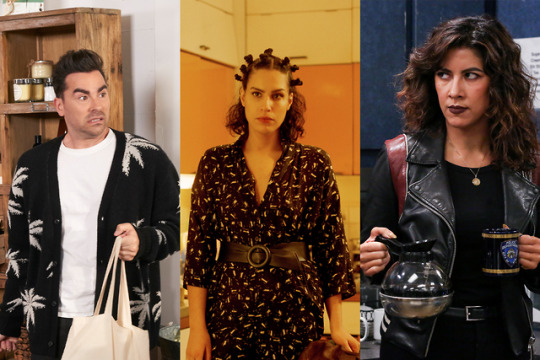
How TV Is Putting the ‘B’ in LGBTQ — And Why It Matters – Rolling Stone
“Mom. Dad. I know you don’t want to talk about this, but I do. I might get married to a man, like you so clearly want. And I might not. Because this is not a phase, and I need you to understand that. I’m bisexual.” That’s Rosa Diaz (Stephanie Beatriz), Brooklyn Nine-Nine’s resident no-nonsense detective, pouring out her heart to her parents in the show’s landmark 100th episode. To which her dad (Danny Trejo) stoically replies, “There’s no such thing as being bisexual.”
Beatriz, who is bisexual herself, wrote in GQ: “When does it end? When do you get to stop telling people you’re bi? When do people start to grasp that this is your truth? …When do you start seeing yourself reflected positively in all (hey, even any?) of the media you consume?”
There’s a real cognitive dissonance to identity erasure. You can be standing right in front of someone telling them exactly who you are, and they can just look right through you, and intone, like a Westworld robot, “That doesn’t look like anything to me.” Nevertheless, it’s a daily reality for LGBTQ folks, and bi- and pansexual people in particular. (The term pansexuality, which has come into wider use in recent years, intends to explicitly refer to attraction to all genders, not just cisgender people — or, as self-identified pansexual Janelle Monae put it in Rolling Stone last year: “I consider myself to be a free-ass motherfucker.” However, many in the queer community define bisexuality the same way. You can read more about that conversation here.) Until recently, sexual and gender identities that existed outside the binary have been anathema to mainstream culture — and often, even, to more traditionalist branches of gay culture.
For a long time, people who identify as bisexual or pansexual didn’t have a whole lot of visible role models — particularly on television. But as our understanding of the LGBTQ spectrum has become more diverse and nuanced over time, there’s been a blossoming of bi- and pansexual representation. In the past few years, characters such as Rosa on Brooklyn Nine-Nine, David Rose on Schitt’s Creek, Darryl Whitefeather on Crazy Ex-Girlfriend, and Leila on The Bisexual — to name just a few — have been at the forefront of a bi- and pansexual renaissance on the small screen.
But it wasn’t always this way. Even after television began to centralize gay characters and their experiences — on shows like Ellen, Will & Grace, Queer as Folk, and The L Word — the “B” in that alphabet soup fell to the wayside. Bisexuality was seldom mentioned at all, and if it was, it existed chiefly as a punch line — an easy ba-dum-CHING moment for savvy characters to nose out someone who wasn’t as in the know as they were. On Sex and the City, Carrie Bradshaw called bisexuality “a layover on the way to Gaytown”; and on 30 Rock, Liz Lemon dismissed it as “something they invented in the Nineties to sell hair products.”
Even some of the earliest shows to break ground for queer representation didn’t factor bisexuality or pansexuality into their worldviews. The designation basically didn’t exist in the gay-straight binary world of Queer as Folk, and was largely seen as a phase on The L Word. Buffy the Vampire Slayer gave many TV viewers their first-ever depiction of a same-sex relationship in 1999 with the Wicca-fueled romance between Willow Rosenberg (Alyson Hannigan) and Tara Maclay (Amber Benson), but the show too neatly glossed over Willow’s years-long relationship with her boyfriend Oz (Seth Green) as a fleeting step on the way to full-time lesbianism. Or, as Willow succinctly put it in Season 5: “Hello! Gay now!”
Characters who labeled themselves as bisexual were considered to be confused at best and dangerously promiscuous at worst. On The O.C. in 2004, Olivia Wilde’s bi bartender character, Alex Kelly, appeared as a destabilizing force of chaos in the lives of the show’s otherwise straight characters. On a 2011 episode of Glee — a show which, at the time, was breaking ground for gay representation on TV — Kurt Hummel (Chris Colfer) savagely shot down his crush, Blaine (Darren Criss), when Blaine mentioned that he might be bi: “‘Bisexual’ is a term that gay guys in high school use when they want to hold hands with girls and feel like a normal person for a change.” By the end of the episode, Blaine assures Kurt that he is, don’t you worry, “100 percent gay.”
One of TV’s first enduring portrayals of nonbinary sexual attraction came with the entrance of Captain Jack Harkness (John Barrowman) into Russell T. Davies’ 2005 Doctor Who reboot. (Davies also created the original U.K. Queer as Folk.) The time traveler swashbuckled into the series to equal-opportunity flirt with the Doctor (Christopher Eccleston) and his companion Rose (Billie Piper), because, as the Doctor explains, “He’s a 51st-century guy. He’s just a bit more flexible.” Captain Jack went on to feature in his own spinoff series, Torchwood.
Then came Callie Torres on Grey’s Anatomy. Portrayed by Sara Ramirez (who came out as bisexual herself in 2016), Callie had a seasons-long arc that spanned from her burgeoning realization of her bisexuality in 2008 to her complex relationships with both men and women over the years. Callie’s drunken rant from the 11th season would make a great T-shirt to wear to Pride if it weren’t quite so long: “So I’m bisexual! So what? It’s a thing, and it’s real. I mean, it’s called LGBTQ for a reason. There’s a B in there, and it doesn’t mean ‘badass.’ OK, it kind of does. But it also means bi!”
Once the 2010s rolled around, representation began to pick up steam. True Blood’s Tara Thornton (Rutina Wesley), The Legend of Korra’s titular hero (Janet Varney), Game of Thrones’ Oberyn Martell (Pedro Pascal), The Good Wife’s Kalinda Sharma (Archie Panjabi), and Peep Show’s Jeremy Usborne (Robert Webb) all were portrayed in romantic relationships on both sides of the binary. But these characters’ sexual orientations were seldom given a name.
In some cases, this felt quietly revolutionary. On post-apocalyptic CW drama The 100, for example, set a century and change in the future, protagonist Clarke Griffin (Eliza Taylor) is romantically involved with both men and women with no mention of labels. Because on the show’s nuclear fallout-ravaged earth, humankind has presumably gotten over that particular prejudice. On other series, however, not putting a name to the thing seems like a calculated choice. Take Orange Is the New Black, a show that has broken a lot of barriers but steadfastly avoids using the B-word to describe its clearly bisexual central character, Piper Chapman (Taylor Schilling).
A few years ago, though, tectonic plates began to shift. On Pop TV sitcom Schitt’s Creek, David Rose (co-creator Dan Levy) explained his pansexuality to his friend via a now-famous metaphor: “I do drink red wine. But I also drink white wine. And I’ve been known to sample the occasional rosé. And a couple summers back, I tried a merlot that used to be a chardonnay.”
Bisexuality got its literal anthem on the CW’s Crazy Ex-Girlfriend with “Gettin’ Bi,” a jubilant Huey Lewis & the News-style number sung by Darryl Whitefeather (Pete Gardner) about waking up to his latent bisexuality as a middle-aged man. “It’s not a phase, I’m not confused / Not indecisive, I don’t have the gotta-choose blues,” he croons, dancing in front of the bi pride flag. Darryl’s exuberant ode to his identity felt like someone levering a window open in a musty room — a celebration of something that, less than a decade before, TV was loathe to acknowledge.
For Hulu and the U.K.’s Channel 4, Desiree Akhavan (Appropriate Behavior, The Miseducation of Cameron Post) cowrote, directed, and starred in a series picking apart the subject, titled, aptly, The Bisexual. In it, Akhavan portrays Leila, a thirtysomething woman coming to a dawning awareness of her bisexuality after having identified as a lesbian for most of her life. The show navigates the tricky territory that bisexuals inhabit when they’re misunderstood — or sometimes outright rejected — by queer and straight communities alike. Akhavan, a bisexual Iranian-American woman, has said the idea for the show came to her after repeatedly hearing herself described as a “bisexual director.” She told Vanity Fair that “there was something about being called a bisexual publicly — even though it’s 100 percent true! — that felt totally humiliating and in bad taste, and I wanted to understand why.”
As Leila shuttles her way between sexual partners and fields tone-deaf comments from friends on both sides of the binary, The Bisexual offers no easy answers. But it also never flinches. “I’m pretty sure bisexuality is a myth. That it was created by ad executives to sell flavored vodka,” Leila remarks in the first episode, unconsciously echoing 30 Rock’s throwaway joke from a decade ago. Except this time, the stakes — and the bi person in question — are real.
The next generation — younger millennials and Gen Z kids in particular — tends to view sexualityas a spectrum rather than the distance between two poles. Akhavan neatly encompasses this evolution in an exchange between Leila and her male roommate’s twentysomething girlfriend, Francisca (Michèlle Guillot), who questions why Leila is so terrified to tell anyone that she’s started sleeping with men as well as women. When Leila tells her it’s complicated because it’s “a gay thing,” Francisca responds, “So? I’m queer.” “Everyone under 25 thinks they’re queer,” says Leila. “And you think they’re wrong?” Francisca counters. Leila considers this for a moment before answering, “No.”
Representation matters, and here’s why: Seeing who you are reflected in the entertainment you take in gives you not just validation for your identity, but also a potential road map for how you might navigate the world. For many years, bi- and pansexuals existed in a liminal place where we were often dismissed outright by not just the straight community — but the queer community as well. Onscreen representation is not just a matter of showing us something we’ve never seen before, but of making the invisible visible, of drawing a new picture over what was once erased.
#bisexual#bisexuality#pansexual#pansexuality#rolling stone#jenna scherer#lgbtq#queer#david rose#the bisexual#desiree akhavan#rosa diaz#brooklyn nine nine#representation#lgbt#pride#television#tv#crazy ex girlfriend#daryl whitefeather#stephanie beatriz#grey's anatomy#callie torres#sarah ramirez
5 notes
·
View notes
Text
Queerness and Death in The Magicians by SE Fleenor (The Removed Syfy Article)
[ NOTE: This article is being reposted in its entirety because it was removed by the Syfy website where it was originally posted. I (estelofimladris) did not write it, but still had it open after its removal. Please read and enjoy - send the writer, S.E. Fleenor, some love if you can. ]
by S.E. Fleenor
SPOILERS FOR THE MAGICIANS SEASON 4 FINALE!
By now you already know that The Magicians’ Quentin Coldwater died in the Season 4 finale. Yes, D-E-D, dead. There’s no resurrection in the works and no trick of astral projection or Niffin state of higher being can bring sweet, depressed, narcissistic Quentin back.
The decision to kill off a major character — the major character, if the Lev Grossman novels still mean anything (they don’t) — is almost always controversial. But we live in the day and age of Game of Thronesand The Walking Dead and Thanos snapping half of the Avengers (and the universe) into nothingness. Any character could die at any moment (and sometimes all of the characters could die at any moment) and that’s the brave, new, kill-happy world our media is made in.
So, why does it matter that Quentin is dead?
Well, my friends, let’s revisit a little trope we like to call Bury Your Gays. Throughout media representations of queer folks, reaching back to 19th-century Victorian novels, the formula has been about the same: An LGBTQ+ character is introduced, they reveal their sexuality or an attraction to a specific person, and then they die, die, die, often horrifically. This trope is also called Dead Lesbian Syndrome due to the overwhelming number of queer women who have been slaughtered onscreen — not exactly the representation queer women have been begging for.
Back when archaic censorship laws ruled the page and the screen, writing about queer characters was taboo and the only way queer writers, or folks who wanted to create queer characters, could include LGBTQ+ characters was by portraying them unfavorably. Queer characters could exist, but only as a warning of what a “perverted” life would bring you. So, in order to get some kind of representation, LGBTQ+ characters had to suffer.
Sounds a little rough, huh? Like who would really bury their gays? Oh, just Buffy the Vampire Slayer, True Blood, The 100, The Walking Dead, The Expanse, Jessica Jones, Xena, Smallville, Battlestar Galactica, Hex, Torchwood, Hemlock Grove, Teen Wolf, Agents of S.H.I.E.L.D., Dracula, The Vampire Diaries, Arrow, Salem, American Horror Story, Ascension, Lost Girl, Scream, The Shannara Chronicles, The Exorcist, Van Helsing, Doctor Who, Gotham, The Handmaid’s Tale, The Purge, and last but not least (and not for the first time): The Magicians.
Let it be noted that I have only included science fiction, fantasy, and horror TV shows on this list and only those that I know about. The list is much, much longer when you include non-genre TV shows and film. (Autostraddle has a very complete list of queer women on TV who have been killed off, for those of you who feel like being sad.)
Oh, did you recognize a bunch of queer-friendly shows in that list? Does that somehow feel like a violation of the promise made when a series goes out of its damn way to present itself as queer and feminist?
EXACTLY. And, that, my sweet babies, is why people are pissed about the death of Quentin Coldwater, generally speaking. We’re sick of seeing queer characters die over and over again. But, what specifically about the death of Quentin is so frustrating? I’m so glad you asked.
Full disclosure: I'm not going to get into the creators' rationale for killing off Quentin. I've read all the interviews with the creators and with Jason Ralph, who plays Quentin, and they all read like a whole lot of familiar BS. (At least Hale Appelman, who plays Eliot, gets it.)
In the first season of The Magicians, Quentin, Eliot, and Margot have a threesome. It’s the first time Quentin has sex with a man, as far as we know, and it’s the first time we see him start to confront his queerness. In Season 3’s “A Life in the Day,” Quentin and Eliot end up in a different Fillory, from before they were born, where they must solve an unsolvable puzzle. As they spend a lifetime working on the mosaic, they fall in love, raise a child, and make their queer family work. Upon returning to the main timeline, barely a word is spoken about their encounter, and queer folks everywhere braced ourselves for that experience to be treated as an anomaly from another timeline. (Another weird queer trope where characters get to be LGBTQ+, but only elsewhere or else when or, or, or…)
Season 4 brought unexpected twists and turns, such as Eliot being trapped inside his own mind by the Monster. With that, many a fan prepared to let Queliot rest. And, then “Escape from the Happy Place,” took us into Eliot’s mind and — after exploring a lot of deep trauma that has a particularly queer flavor to it — back to the day Eliot and Quentin came back from their lifetime in Fillory. As they sit on the steps of the throne room, Memory Quentin and Memory Eliot talk about what happened between them. Memory Quentin asks Memory Eliot why they shouldn’t try to be together, saying “Who gets proof of concept like that?”
Eliot kisses Memory Quentin hard on the mouth and then walks through the door that will allow him to take control of his body for a moment. In the real world, face to face with Quentin, Eliot gets a signal out that he’s still alive. He looks at Quentin and repeats the question Quentin had asked him, following it with, “Peaches and plums, motherf*cker.” When he realizes who he’s looking at, Quentin hesitates, a look of surprise and longing washing over his face.
This deeply emotional and compelling storyline appeared at the same time that Quentin finally officially rebuffed Alice’s advances, telling her he no longer wanted to be together, that he could never see her the same way again.
Then, after all that work, after all the maturation the characters undergo, the series undoes everything, shoehorning in a last-minute declaration of love between Quentin and Alice and killing off Quentin when he uses magic in the Mirror Realm, without ever seeing Eliot again. Quentin then goes to the Underworld branch of the library and meets with Penny 40 while reminiscing over his life and pondering over whether or not he died by suicide. (The treatment of suicide in the episode is problematic and deeply offensive.)
There are probably as many critiques of this ending as there are people who watched it, but I’m going to focus on the main issues that stood out to me.
The series has gone out of its way to confirm Quentin as queer and tease the possibility of a queer love story.
Queer viewers are used to surviving off subtext and tend to be fairly generous in what we’ll accept. Seriously, many a queer considers Thor: Ragnarok to be part of the queer canon when it’s not even implied onscreen that anyone is queer, and have you seen people shipping Carol and Maria in Captain Marvel? Maybe it’s because we’re used to being served scraps that the Bury Your Gays trope feels so pointed. Oh, you’re not happy with the almosts and the could-haves and the alternate timelines of queerness? Well, then we’ll make your characters queer and just murder ‘em right up.
After Season 3, The Magicians could have never acknowledged the relationship between Quentin and Eliot that takes place in another timeline or they could have shrugged and been like, “Must have been the opium in the air!” They’d already done as much with the threesome in Season 1 and all but ignoring Quentin's queerness in the episodes that follow. The series didn’t have to confirm that Quentin wanted to follow his attraction to Eliot and give being together a try. But, The Magiciansdid. The series took the time onscreen to show Eliot and Quentin kissing again, to show Eliot declaring his love for Quentin in their own code, and to show Quentin dedicate his time to helping Eliot get free.
Furthermore, how messed up is it that the series spends a significant amount of time dredging up the trauma of Eliot’s queer youth only to make him realize his biggest regret is how he treated Quentin, just for Quentin to be forced back into the closet? An episode that was deeply evocative and affirming of queerness smacks of voyeurism when taken in the context of the finale.
At the last minute, after confirming his queerness, the series forces a relationship between Quentin and Alice.
It’s hard not to see the last ditch shoving of Quentin and Alice together as an attempt to shove Quentin himself back in the closet. Season 4 shows Quentin rejecting and wanting to be apart from Alice, only for him to decide that he loves her and wants to give their relationship another try because? Honestly, I’m not sure what rationale he uses because it MAKES NO SENSE. And, what the hell does he think of imprisoned-in-his-own-body Eliot while making this decision? To judge from the series, not a whole hell of a lot.
It’s totally cool if queer or bisexual characters date people of different genders — that’s not the issue. The issue is that without a moment of hesitation, Quentin whiplashes from his lover who he knows is trapped by the Monster and cannot see, hear, or reach him to his ex-girlfriend who he has distanced himself from due to her selfish behavior.
In the context of his death, I like to call this particularly messed up turn of events “Bury Your Gays and Stomp On Their Graves” because all the work that had been done to show Quentin’s coming to terms with his own sexuality is undone shortly before he dies.
There are other ways to write a character off a series.
A lot of people fall back on bad faith arguments like: what is a show supposed to do when an actor no longer wishes to appear in the series?
The answer, of course, is: ANYTHING ELSE. They could have done literally anything else to write Quentin out of the show and release Jason Ralph from his commitment. The Magicians takes place in a world WHERE MAGIC EXISTS, where characters leave the main story to go on their own adventures, and where average human beings can become gods. There’s no excuse for falling into lazy storytelling and reifying a trope that has been well-documented and mourned for a long time.
In the novels, Quentin gets kicked out of Fillory and decides to use his discipline, minor mendings, to build a new world for himself and Alice. He essentially walks through a door and never comes back. THAT WOULD HAVE WORKED and it wouldn’t do the work of retraumatizing queer audiences.
It comes down to this: To ignore the wider implications of making a character specifically queer, having him return to his prior unhealthy relationship with a woman, and then killing him off is a disservice to queer people everywhere. It is, at once, a declaration of the meaninglessness of the queer experience and an unforgivable reminder of the expendability of queer lives.
Series like The Magicians (and before it, Buffy the Vampire Slayer) trade on their reputations as queer and feminist shows. We watch them for their powerful women and their kickass queer characters and their storylines that affirm the power of survival. And what do they give us in return? They bury their gays.
Does that mean that all LGBTQ+ characters should be immortal? The rational response would be: of course not. Up until today I may have agreed with that argument, but right now I’m feeling a little less generous. It’s 20-f*cking-19 and there is no excuse for Bury Your Gays to pop up in a progressive TV show. Maybe until series and creators who make their money off queer characters and queer fandom take responsibility for how they use the lives and bodies of queer people, maybe until then, all LGBTQ+ characters should be immortal.
I’m pretty damn sick of watching every character who loves like me, who looks like me, who explores the bounds of their sexuality like me, die. I’m sick of watching characters bust down the doors of the closets that held them back only to have their queerness erased or elided through their deaths. I’m sick of watching relationships between men and women blossom onscreen only to see queer relationships torn apart by death.
Queer people deserve happy endings. We deserve them in real life and we deserve to see them onscreen and we deserve them now.
Until that’s the norm, you better damn well consider any queer character you create immortal. Because if you don’t, we queers will f*cking haunt your basic ass.
#quentin coldwater#the magicians#the magicians spoilers#peoplelikeme#quentin coldwater deserved better#syfy#se fleenor#i own nothing
6 notes
·
View notes
Text
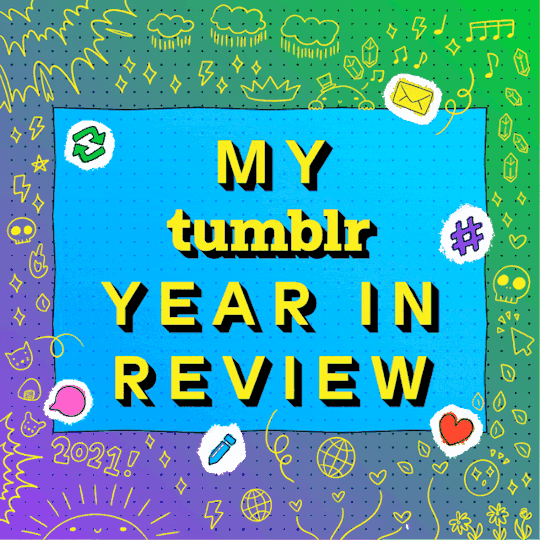
I posted 445 times in 2021
25 posts created (6%)
420 posts reblogged (94%)
For every post I created, I reblogged 16.8 posts.
I added 269 tags in 2021
#tcor56 - 45 posts
#the children of room 56 - 44 posts
#room 56 - 42 posts
#queer podcast - 31 posts
#horror podcast - 30 posts
#new podcast - 18 posts
#lgbtq - 18 posts
#podcast - 15 posts
#chip romero - 14 posts
#queer horror - 12 posts
Longest Tag: 65 characters
#i'm trans and i will promote my podcast in an extremely trans way
My Top Posts in 2021
#5
happy ace week from room 56!!!
I realize we’re almost through the week but happy ace week from us here at room 56! we'd like to reaffirm that ace people are valid, and anyone who dares to say otherwise can meet us for a lovely walk next to the tooth lake where you may or may not fall in on accident /hj
we happen to have a plethora of characters on the asexual spectrum that we'd like to highlight, including but not limited to:
hyacinthe pearce- one of the many doctors in the town, ren to the angsty evan pearce, and demisexual greyromantic
aster ross- junior necromancer, classmate to the spiritsford paranormal investigation squad, and aroace
evan pearce- angsty boy featured in our september mini episode "eye won't say I'm in love" (link in bio), member of spis, and demiromantic asexual
jordan ambrose- school radio host, friend of spis, and demisexual homie
shawn manning- definitely a man, classmate of spis, and greyace icon
all three town wizards- iconic, astounding, some unspecified flavor of asexual
11 notes • Posted 2021-10-28 01:27:53 GMT
#4
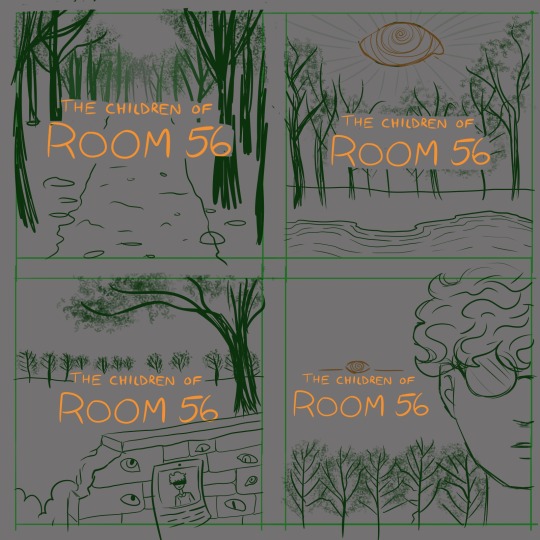
Some other possible cover art designs we were considering before deciding on the one we have now.
All art by @/samiam.art on Instagram
13 notes • Posted 2021-01-21 15:03:07 GMT
#3
HAPPY PRIDE FROM THE ROOM 56 TEAM!
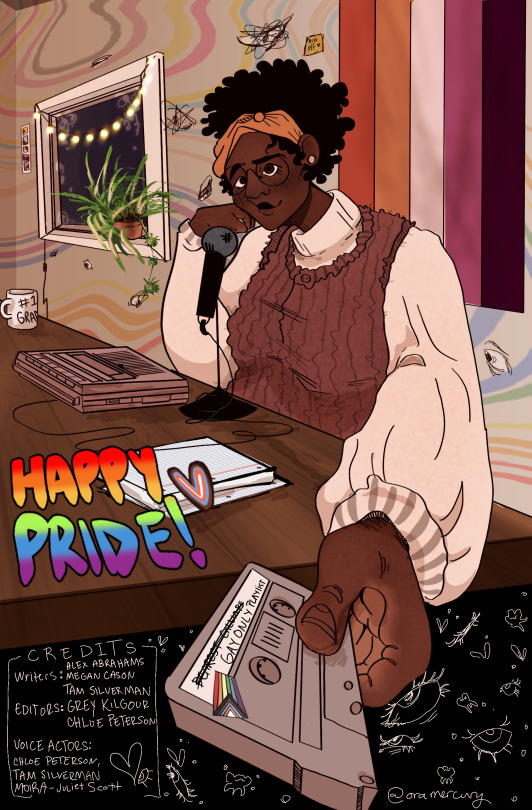
Happy Pride from the Room 56 team!
Our pride mini episode “Let’s Go Lesbians!” will be released on Friday the 25th of June, 6pm BST and we can’t wait for everyone to hear it!
Until then, enjoy this lovely poster by one of our artists, Megan Cason!
14 notes • Posted 2021-06-18 15:36:19 GMT
#2
CHARACTER ART!!!
Sam Moss (She/Her)
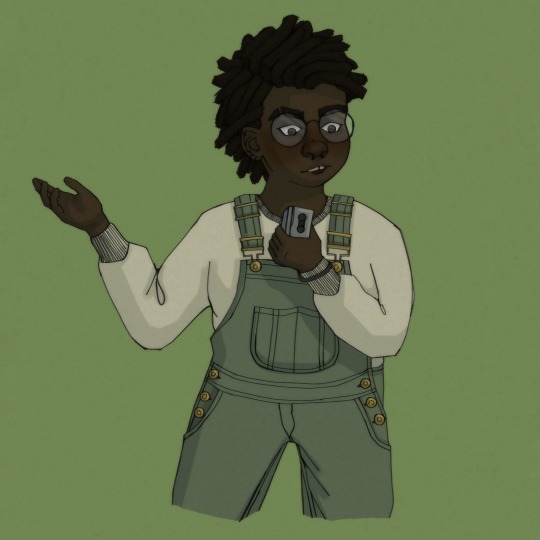
Evan Pearce (He/Him)
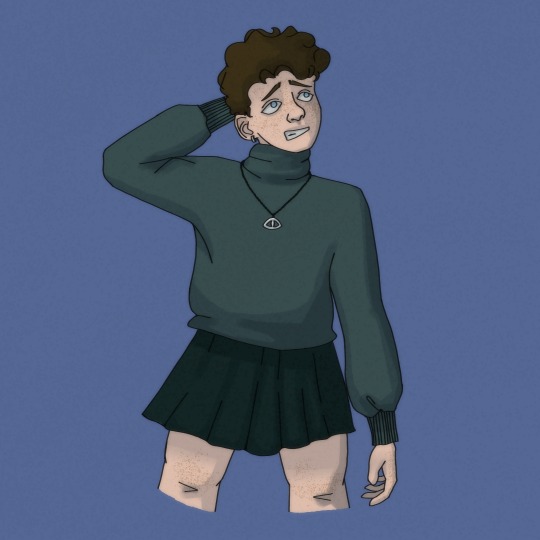
Calliope Morris (She/Her)
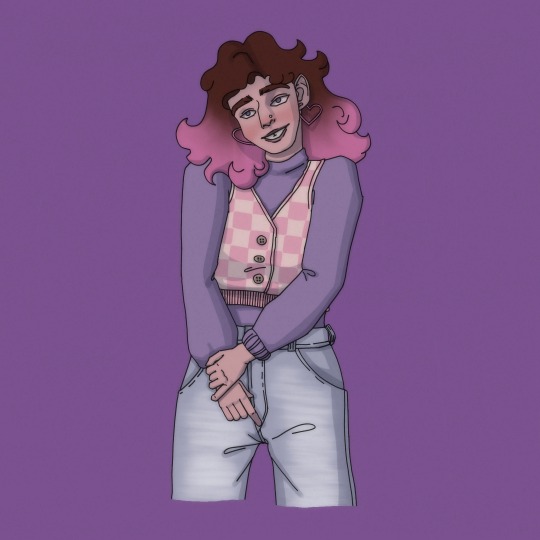
Nicky Dixon (He/Him)
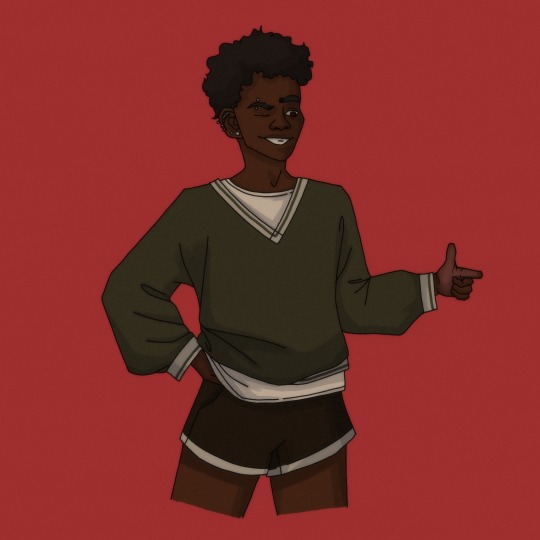
Freddie Shaw (He/Him)
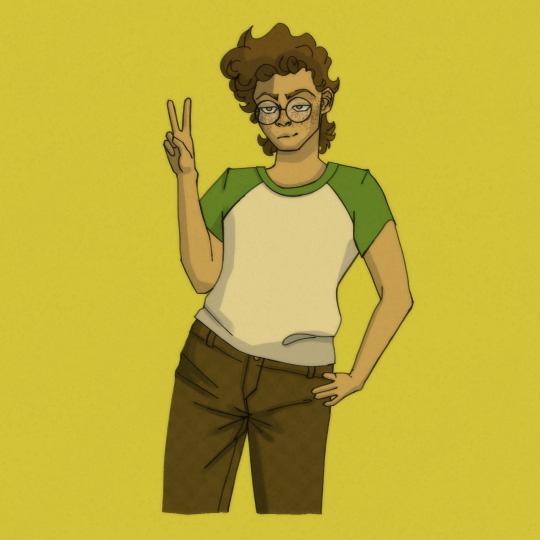
Chip Romero (He/Him)
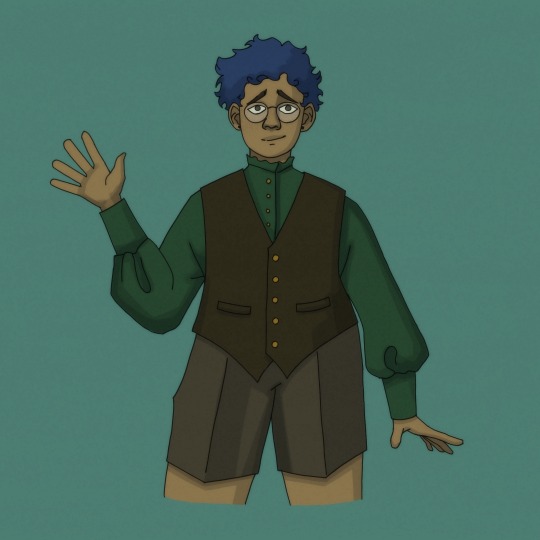
These are the main six characters in The Children of Room 56!
All art by @/vaugehumanoidshape on Instagram!
14 notes • Posted 2021-05-30 18:30:19 GMT
#1
WHICH ROOM 56 CHARACTER ARE YOU?
Take this quiz that one of our voice actors made!!!
https://uquiz.com/quiz/W31W8q?p=1747605
18 notes • Posted 2021-06-23 13:58:32 GMT
Get your Tumblr 2021 Year in Review →
1 note
·
View note